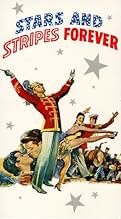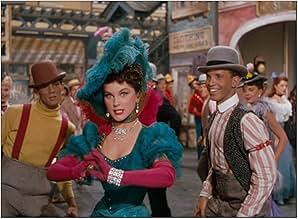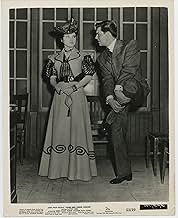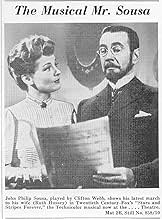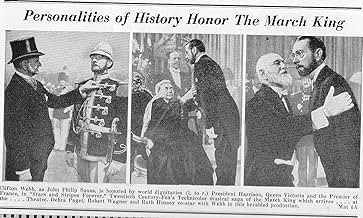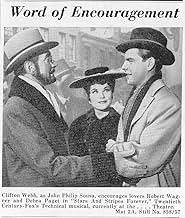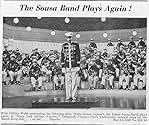IMDb-BEWERTUNG
7,1/10
1016
IHRE BEWERTUNG
Füge eine Handlung in deiner Sprache hinzuA film biography of the composer John Philip Sousa, from his early days in the Marine Corps Band through the Spanish-American War in 1898.A film biography of the composer John Philip Sousa, from his early days in the Marine Corps Band through the Spanish-American War in 1898.A film biography of the composer John Philip Sousa, from his early days in the Marine Corps Band through the Spanish-American War in 1898.
- Regie
- Drehbuch
- Hauptbesetzung
- Auszeichnungen
- 3 Nominierungen insgesamt
Thomas Browne Henry
- David Blakely
- (as Tom Browne Henry)
Frank Ferguson
- Mr. Wells
- (Gelöschte Szenen)
Aladdin
- Orchestra Conductor
- (Nicht genannt)
- …
Bill Alcorn
- Specialty Dancer
- (Nicht genannt)
Sharon Jan Altman
- Helen Sousa
- (Nicht genannt)
Jon Andrews
- Minor Role
- (Nicht genannt)
John Baer
- Chorus Boy at 'El Capitan' Rehearsal
- (Nicht genannt)
Barbara Bailey
- Dancer
- (Nicht genannt)
Patricia Barker
- Minor Role
- (Nicht genannt)
Alvin Beam
- Minor Role
- (Nicht genannt)
Bobker Ben Ali
- Reporter
- (Nicht genannt)
Empfohlene Bewertungen
What should be understood is that Stars and Stripes Forever is in no way a full biography of the famous March King which was the nickname given to John Philip Sousa. It is rather a portrait of the era known as the Gay Nineties in America where Sousa first achieved his reputation and prominence. Also included is a romance between fictional characters played by Robert Wagner and Debra Paget.
In that beard with those pince nez glasses, Clifton Webb looks remarkably like John Philip Sousa in that period and by reputation, Sousa was as much a dilettante as Webb normally played on screen which made him perfect casting. After leaving the Marine Corps band, Sousa formed his own orchestra which became world famous and toured the globe well into the Twenties.
But our story concerns Sousa the March King. Though he composed all kinds of music, it is his marches that have come down today and have given him his reputation. The Marine Corps official march, Semper Fidelis, was composed by Sousa and the incident involving President Benjamin Harrison as depicted in Stars and Stripes Forever is somewhat true. The Marine Corps Band was playing at a White House reception and the Harrison who was not the most social of presidents ordered Sousa to speed up the tempo so the receiving line would move at a brisk pace.
Ruth Hussey is cast in the Myrna Loy type role of the perfect understanding mate for her genius husband and she fulfills the role admirably. Even Clifton Webb does make you forget you're watching Clifton Webb and you do think you are seeing the real Sousa.
Stars and Stripes Forever is an admirable film and of course the finale does have several bands and marching armed forces personnel playing and marching to Sousa's most famous composition.
In that beard with those pince nez glasses, Clifton Webb looks remarkably like John Philip Sousa in that period and by reputation, Sousa was as much a dilettante as Webb normally played on screen which made him perfect casting. After leaving the Marine Corps band, Sousa formed his own orchestra which became world famous and toured the globe well into the Twenties.
But our story concerns Sousa the March King. Though he composed all kinds of music, it is his marches that have come down today and have given him his reputation. The Marine Corps official march, Semper Fidelis, was composed by Sousa and the incident involving President Benjamin Harrison as depicted in Stars and Stripes Forever is somewhat true. The Marine Corps Band was playing at a White House reception and the Harrison who was not the most social of presidents ordered Sousa to speed up the tempo so the receiving line would move at a brisk pace.
Ruth Hussey is cast in the Myrna Loy type role of the perfect understanding mate for her genius husband and she fulfills the role admirably. Even Clifton Webb does make you forget you're watching Clifton Webb and you do think you are seeing the real Sousa.
Stars and Stripes Forever is an admirable film and of course the finale does have several bands and marching armed forces personnel playing and marching to Sousa's most famous composition.
Although it probably only has the most tenuous connection with the actual John Philip Sousa's home life this is a highly enjoyable even rousing biography of the famed musician and band leader.
Clifton Webb is such spot on casting as Sousa from his resemblance to the man through his clipped speak and regal bearing it almost seems as if Sousa was invented for him expressly. Ruth Hussey is terrific fun as Mrs. Sousa, sassy and tart but displaying infinite patience for her persnickety husband. The two of them make a great pair showing in subtle ways that even though they have small habits that drive each other crazy there was a deep love the couple shared over the years.
In a fabricated subplot Robert Wagner and Debra Paget, both almost supernaturally beautiful, as a young musician and the music hall entertainer that he loves are bursting with vitality and youthful exuberance.
All of them are highly engaging but it's really the music that the film is about and it's stuffed from one end to the other with classic Sousa marches and his other compositions. The film is bandbox pretty, every frame practically pulsates with ultra bright Technicolor. There is one somber passage where the war touches all the main characters lives but overall the movie is a cheery experience and leaves you in a toe tapping upbeat mood at its conclusion.
A most satisfying diversion especially for lovers of marching music.
Clifton Webb is such spot on casting as Sousa from his resemblance to the man through his clipped speak and regal bearing it almost seems as if Sousa was invented for him expressly. Ruth Hussey is terrific fun as Mrs. Sousa, sassy and tart but displaying infinite patience for her persnickety husband. The two of them make a great pair showing in subtle ways that even though they have small habits that drive each other crazy there was a deep love the couple shared over the years.
In a fabricated subplot Robert Wagner and Debra Paget, both almost supernaturally beautiful, as a young musician and the music hall entertainer that he loves are bursting with vitality and youthful exuberance.
All of them are highly engaging but it's really the music that the film is about and it's stuffed from one end to the other with classic Sousa marches and his other compositions. The film is bandbox pretty, every frame practically pulsates with ultra bright Technicolor. There is one somber passage where the war touches all the main characters lives but overall the movie is a cheery experience and leaves you in a toe tapping upbeat mood at its conclusion.
A most satisfying diversion especially for lovers of marching music.
The only indisputable and exciting great element in "Stars and Stripes Forever" is its music...
Clifton Webb does a fine work as the great band-master and composer of memorable marches who, on the 1890's, when he leaves the Marines Corps., forms his own concert band and travels around the world...
With the sensitive and beautiful Debra Paget as the singer-dancer, and the sympathetic and good-looking Robert Wagner as the horn player, the loving couple shares a real and firm part of the 'imagined' tale...
The great highlights of the picture are when a black choir is singing "The Battle Hymn Of The Republic," and the outstanding performance of "Dixie," played by Philip Sousa and his Orchestra as they enter the Cotton States Exposition in Atlanta...
With Ruth Hussey playing Sousa's sensible wife, and with vivid costumes and a rich amount of Sousa's music, this colorful film is charming and entertaining all the way...
Clifton Webb does a fine work as the great band-master and composer of memorable marches who, on the 1890's, when he leaves the Marines Corps., forms his own concert band and travels around the world...
With the sensitive and beautiful Debra Paget as the singer-dancer, and the sympathetic and good-looking Robert Wagner as the horn player, the loving couple shares a real and firm part of the 'imagined' tale...
The great highlights of the picture are when a black choir is singing "The Battle Hymn Of The Republic," and the outstanding performance of "Dixie," played by Philip Sousa and his Orchestra as they enter the Cotton States Exposition in Atlanta...
With Ruth Hussey playing Sousa's sensible wife, and with vivid costumes and a rich amount of Sousa's music, this colorful film is charming and entertaining all the way...
This picture is always a sempar fidelis-It's always faithful when viewing. It is certainly a rousing tribute to the march king-John Philip Sousa.
The film takes us from the career of Sousa is the Marine Marching band to life afterward. Interesting that he served 5 presidents during his tenure with the marines.
Robert Wagner and Debra Paget play the couple who worked with Sousa in his band and married. The film briefly relates how they thought they'd keep their marriage a secret from Sousa. Wagner made his film debut the same year as this film in the other rousing "With A Song in My Heart." He certainly got experience with crutches in both films. Paget, will forever be remembered as Lilia, the water-girl in the epic "The 10 Commandments." Ironically, her name in this film was Lily as well.
The music was excellently staged and Clifton Webb was in fine form as Sousa. Why? It always seemed that Webb, a fine actor, was always a perfectionist in his films. This film was certainly no exception.
Again, a definitely rousing tribute to a great American. Ruth Hussey, who played Webb's wife in the film, was totally subordinate here. That's how the lifestyle was in the 1890s.
The film takes us from the career of Sousa is the Marine Marching band to life afterward. Interesting that he served 5 presidents during his tenure with the marines.
Robert Wagner and Debra Paget play the couple who worked with Sousa in his band and married. The film briefly relates how they thought they'd keep their marriage a secret from Sousa. Wagner made his film debut the same year as this film in the other rousing "With A Song in My Heart." He certainly got experience with crutches in both films. Paget, will forever be remembered as Lilia, the water-girl in the epic "The 10 Commandments." Ironically, her name in this film was Lily as well.
The music was excellently staged and Clifton Webb was in fine form as Sousa. Why? It always seemed that Webb, a fine actor, was always a perfectionist in his films. This film was certainly no exception.
Again, a definitely rousing tribute to a great American. Ruth Hussey, who played Webb's wife in the film, was totally subordinate here. That's how the lifestyle was in the 1890s.
10lawprof
John Philip Sousa was not only America's "March King," he was a skilled organizer and entertainer who also composed much music now thoroughly unknown to most Americans (and fans elsewhere). His life spanned the era of an optimistic, brash America where live music was the only music to the burgeoning and eventually triumphant victory of an insatiable technology that even in Sousa's lifetime was employed to record almost everything. Sousa benefited from the new world of recording and he can be heard on compact disc in his later years conducting his famed quasi-military band.
20th Century Fox enlisted a cadre of fine performers for a seamlessly entertaining biopic of John Philip Sousa with a nice, anachronistically innocent, fictional romance interwoven with the band leader/composer's story.
As Sousa Clifton Webb brings to life a character who was, as in reality, ambitious and driven to succeed. Sousa left the Marine Corps, where he led The President's Own, to start his hand-picked band. In uniforms which the leader designed, the outfit mirrored great military bands (of which the U.S., as opposed to England, had a clear shortage during Sousa's life). Sousa understood the importance of touring and he was light years ahead of the twentieth century's pops ensembles in making his musicians - and his music - as ubiquitous as travel of his day allowed.
Sousa's patient and adoring wife, Jennie, is well played by Ruth Hussey.
A nice romantic plot is the courtship of aspiring singer Lily Becker and the alleged inventor of the sousaphone, Willie Little. Lily is the gorgeous Debra Paget and Willie the young and upcoming Robert Wagner. Neither character existed in real life but their romance is well threaded into Sousa's story and is coyly affecting.
1952 was a hard year for many Americans. A self-designated lame duck president presided over an unpopular war, the first in our history in which victory in the traditional military sense wasn't a strategic or political objective. "The Stars and Stripes Forever" was a refreshing patriotic film that didn't require thinking about the realities of the day. I remember seeing it as a kid and loving every minute. I still watch it occasionally.
Credit also goes to the producer and to director Henry Koster for including a scene at an Atlanta festival where a black chorus sings The Battle Hymn of the Republic under Sousa's baton right after a rousing version of Dixie was performed. This was two years before Brown v. Board of Education, the Supreme Court's belated start of the final assault on the obscenity of legalized racial discrimination. I doubt everyone in the South felt good about that scene.
Musical pieces are well interwoven with the story and the final minutes have Sousa's most famous march, also the movie's title, played with a segue from his band to contemporary marching marines and soldiers. His superimposed spectral leading is a fine reminder of his role. A very nice touch.
Folks who only know Sousa from a relative handful of oft-performed and wonderful marches should check out his less well-known music. NAXOS is currently releasing a series of CDs of works that reflect Sousa's extraordinary creativity. But above all, Americans owe him an everlasting debt for composing stirring music that still animates listeners as it did when first performed under his baton.
10/10
20th Century Fox enlisted a cadre of fine performers for a seamlessly entertaining biopic of John Philip Sousa with a nice, anachronistically innocent, fictional romance interwoven with the band leader/composer's story.
As Sousa Clifton Webb brings to life a character who was, as in reality, ambitious and driven to succeed. Sousa left the Marine Corps, where he led The President's Own, to start his hand-picked band. In uniforms which the leader designed, the outfit mirrored great military bands (of which the U.S., as opposed to England, had a clear shortage during Sousa's life). Sousa understood the importance of touring and he was light years ahead of the twentieth century's pops ensembles in making his musicians - and his music - as ubiquitous as travel of his day allowed.
Sousa's patient and adoring wife, Jennie, is well played by Ruth Hussey.
A nice romantic plot is the courtship of aspiring singer Lily Becker and the alleged inventor of the sousaphone, Willie Little. Lily is the gorgeous Debra Paget and Willie the young and upcoming Robert Wagner. Neither character existed in real life but their romance is well threaded into Sousa's story and is coyly affecting.
1952 was a hard year for many Americans. A self-designated lame duck president presided over an unpopular war, the first in our history in which victory in the traditional military sense wasn't a strategic or political objective. "The Stars and Stripes Forever" was a refreshing patriotic film that didn't require thinking about the realities of the day. I remember seeing it as a kid and loving every minute. I still watch it occasionally.
Credit also goes to the producer and to director Henry Koster for including a scene at an Atlanta festival where a black chorus sings The Battle Hymn of the Republic under Sousa's baton right after a rousing version of Dixie was performed. This was two years before Brown v. Board of Education, the Supreme Court's belated start of the final assault on the obscenity of legalized racial discrimination. I doubt everyone in the South felt good about that scene.
Musical pieces are well interwoven with the story and the final minutes have Sousa's most famous march, also the movie's title, played with a segue from his band to contemporary marching marines and soldiers. His superimposed spectral leading is a fine reminder of his role. A very nice touch.
Folks who only know Sousa from a relative handful of oft-performed and wonderful marches should check out his less well-known music. NAXOS is currently releasing a series of CDs of works that reflect Sousa's extraordinary creativity. But above all, Americans owe him an everlasting debt for composing stirring music that still animates listeners as it did when first performed under his baton.
10/10
Wusstest du schon
- WissenswertesAccording to Paul Bierley's biography of John Philip Sousa, "John Philip Sousa, American Phenomenon", several musicians who had played under Sousa attended the world premiere of the film but walked out in disgust.
- PatzerIn the film the famous Sousaphone was invented by Willy Little. In actuality the first sousaphone was developed by James Welsh Pepper in 1893 at the request of John Philip Sousa.
- Zitate
John Philip Sousa: What in the name of all get out's been keeping you so long?
Jennie Sousa: I was hearing the children's prayers.
John Philip Sousa: Does that take all night?
Jennie Sousa: They were praying for you.
- Crazy CreditsDuring the opening display of 20th Century Fox's logo, Sousa's "Semper Fidelis" was played instead of the usual 20th Century fanfare
- Alternative VersionenSome releases include at the end a clip of the real John Philip Sousa leading the band in one of his famous marches.
- VerbindungenFeatured in Family Classics: Family Classics: Stars and Stripes Forever (1963)
- SoundtracksSemper Fidelis
(uncredited)
Music by John Philip Sousa (1888)
Played during the opening credits
Also played by the Marine band at the presidential reception
Top-Auswahl
Melde dich zum Bewerten an und greife auf die Watchlist für personalisierte Empfehlungen zu.
- How long is Stars and Stripes Forever?Powered by Alexa
Details
- Erscheinungsdatum
- Herkunftsland
- Sprache
- Auch bekannt als
- Stars and Stripes Forever
- Drehorte
- Produktionsfirma
- Weitere beteiligte Unternehmen bei IMDbPro anzeigen
- Laufzeit1 Stunde 30 Minuten
Zu dieser Seite beitragen
Bearbeitung vorschlagen oder fehlenden Inhalt hinzufügen

Oberste Lücke
By what name was Liebe, Pauken und Trompeten (1952) officially released in India in English?
Antwort
